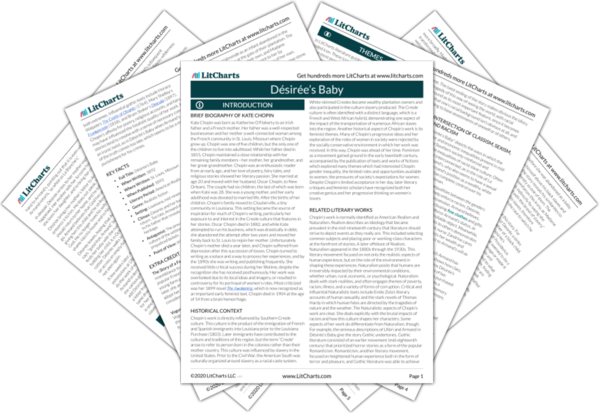Baby Quotes in Désirée’s Baby
“This is not the baby!” she exclaimed, in startled tones.

Unlock explanations and citation info for this and every other Désirée’s Baby quote.
Plus so much more...
Get LitCharts A+“…he hasn’t punished one of them—not one of them—since baby is born. Even Négrillon, who pretended to have burnt his leg that he might rest from work—he only laughed, and said Négrillon was a great scamp. Oh, mamma, I’m so happy; it frightens me.”
Marriage, and later the birth of his son had softened Armand Aubigny’s imperious and exacting nature greatly. This was what made the gentle Désirée so happy, for she loved him desperately. When he frowned she trembled, but loved him. When he smiled, she asked no greater blessing of God.
Then a strange, an awful change in her husband’s manner, which she dared not ask him to explain. When he spoke to her, it was with averted eyes, from which the old love-light seemed to have gone out. He absented himself from home; and when there, avoided her presence and that of her child, without excuse. And the very spirit of Satan seemed suddenly to take hold of him in his dealings with the slaves. Désirée was miserable enough to die.
One of La Blanche’s little quadroon boys—half naked too— stood fanning the child slowly with a fan of peacock feathers. Désirée’s eyes had been fixed absently and sadly upon the baby, while she was striving to penetrate the threatening mist that she felt closing about her. She looked from her child to the boy who stood beside him, and back again; over and over. “Ah!” It was a cry that she could not help; which she was not conscious of having uttered. The blood turned like ice in her veins, and a clammy moisture gathered upon her face.
"Armand,” she panted once more, clutching his arm, “look at our child. What does it mean? tell me.”
He coldly but gently loosened her fingers from about his arm and thrust the hand away from him. “Tell me what it means!” she cried despairingly.
“It means,” he answered lightly, “that the child is not white; it means that you are not white.”
“It is a lie; it is not true, I am white! Look at my hair, it is brown; and my eyes are gray, Armand, you know they are gray. And my skin is fair,” seizing his wrist. “Look at my hand; whiter than yours, Armand,” she laughed hysterically.
“As white as La Blanche’s,” he returned cruelly; and went away leaving her alone with their child.
She disappeared among the reeds and willows that grew thick along the banks of the deep, sluggish bayou; and she did not come back again.

Baby Quotes in Désirée’s Baby
“This is not the baby!” she exclaimed, in startled tones.

Unlock explanations and citation info for this and every other Désirée’s Baby quote.
Plus so much more...
Get LitCharts A+“…he hasn’t punished one of them—not one of them—since baby is born. Even Négrillon, who pretended to have burnt his leg that he might rest from work—he only laughed, and said Négrillon was a great scamp. Oh, mamma, I’m so happy; it frightens me.”
Marriage, and later the birth of his son had softened Armand Aubigny’s imperious and exacting nature greatly. This was what made the gentle Désirée so happy, for she loved him desperately. When he frowned she trembled, but loved him. When he smiled, she asked no greater blessing of God.
Then a strange, an awful change in her husband’s manner, which she dared not ask him to explain. When he spoke to her, it was with averted eyes, from which the old love-light seemed to have gone out. He absented himself from home; and when there, avoided her presence and that of her child, without excuse. And the very spirit of Satan seemed suddenly to take hold of him in his dealings with the slaves. Désirée was miserable enough to die.
One of La Blanche’s little quadroon boys—half naked too— stood fanning the child slowly with a fan of peacock feathers. Désirée’s eyes had been fixed absently and sadly upon the baby, while she was striving to penetrate the threatening mist that she felt closing about her. She looked from her child to the boy who stood beside him, and back again; over and over. “Ah!” It was a cry that she could not help; which she was not conscious of having uttered. The blood turned like ice in her veins, and a clammy moisture gathered upon her face.
"Armand,” she panted once more, clutching his arm, “look at our child. What does it mean? tell me.”
He coldly but gently loosened her fingers from about his arm and thrust the hand away from him. “Tell me what it means!” she cried despairingly.
“It means,” he answered lightly, “that the child is not white; it means that you are not white.”
“It is a lie; it is not true, I am white! Look at my hair, it is brown; and my eyes are gray, Armand, you know they are gray. And my skin is fair,” seizing his wrist. “Look at my hand; whiter than yours, Armand,” she laughed hysterically.
“As white as La Blanche’s,” he returned cruelly; and went away leaving her alone with their child.
She disappeared among the reeds and willows that grew thick along the banks of the deep, sluggish bayou; and she did not come back again.











